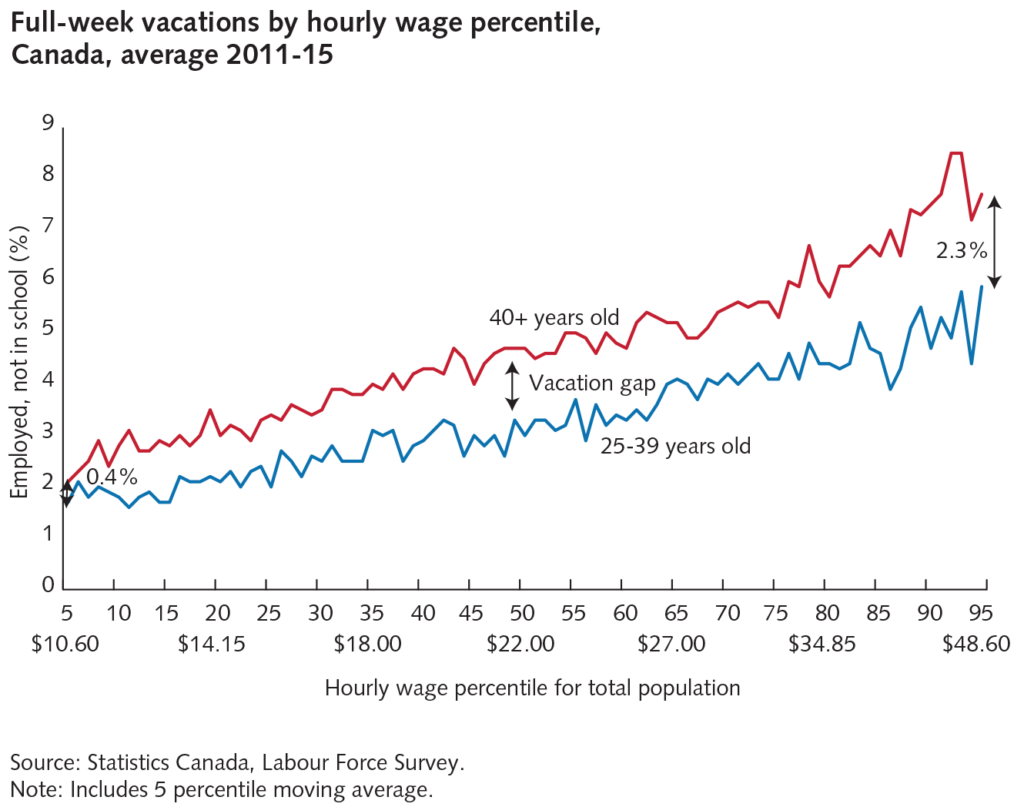
Summer feels over. Did you take your vacation?
Chances are, if you are a millennial, the answer is: not really.
We looked at some data from the Canadian Labour Force Survey and found that, despite the stereotype of the lazy millennial, Canadians aged 25 to 39 actually take less vacation than boomers across all incomes. The survey measures how many people took five straight business days off work, so it doesn’t take into account the extra days you might take off work for a long weekend like Thanksgiving.
We found it curious that the generation that is single-handedly fuelling the so-called experience economy would lag when it came to claiming vacation time. This restraint doesn’t have anything to do with the weaker dollar or a distaste for leisure time.
Nor is taking less vacation time associated with being less affluent than your peers. In fact, millennials in higher wage percentiles are even less likely to take a week of vacation compared with the generation ahead of them in the same wage category, and the gap widens as wage percentiles go up.
This means that younger Canadians are taking less vacation, independent of their income.
The real question raised by this “vacation gap” is whether this generation is exhibiting a clear preference for work over recreation (oh man, we hope not) or reacting prudently to less job security and a general inability to plan for the future. Our guess is that it’s a mix of both factors.
The confidence required to take a week-long (five business days) vacation is definitely linked to job security as well as income. Not only do you need to feel secure enough that you can take time off from your role, you also require sufficient disposable income to fuel vacation spending.
Meanwhile, precarious, short-term, contract-based work does not lend itself to luxurious summer breaks. This kind of employment situation is increasingly characteristic of the millennial generation.
We wondered about the vacation gap. It could be that people are taking shorter vacations, clustering their vacation days around weekends. It may also be that the more flexible work environments favoured by millennials enable young workers to work from anywhere and accrue lieu time, which they can then capitalize on as vacation, reducing the amount of formal vacation days taken. It could also be a function of lower unionization levels.
One full week of vacation seems like a reasonable baseline for individuals to enjoy. It remains to be seen whether millennials will take more vacation over time or as they (we!) age and continue to establish their own families and transition into a new life stage. Perhaps the division between work and leisure has been so eroded by technological evolution that we will continue to see Canadians enjoying fewer of the vacation days offered by their employer.
Photo: studiostoks / Shutterstock.com
This article is part of the Public Policy and Young Canadians special feature.
Do you have something to say about the article you just read? Be part of the Policy Options discussion, and send in your own submission. Here is a link on how to do it. | Souhaitez-vous réagir à cet article ? Joignez-vous aux débats d’Options politiques et soumettez-nous votre texte en suivant ces directives.










